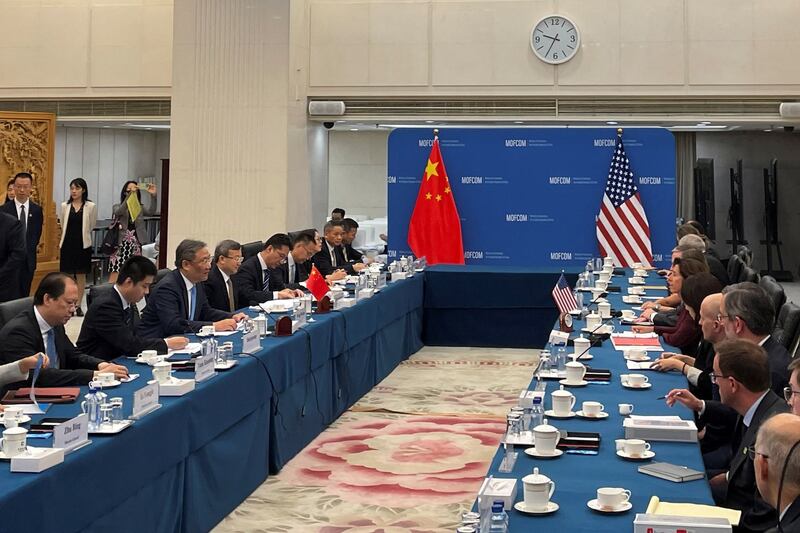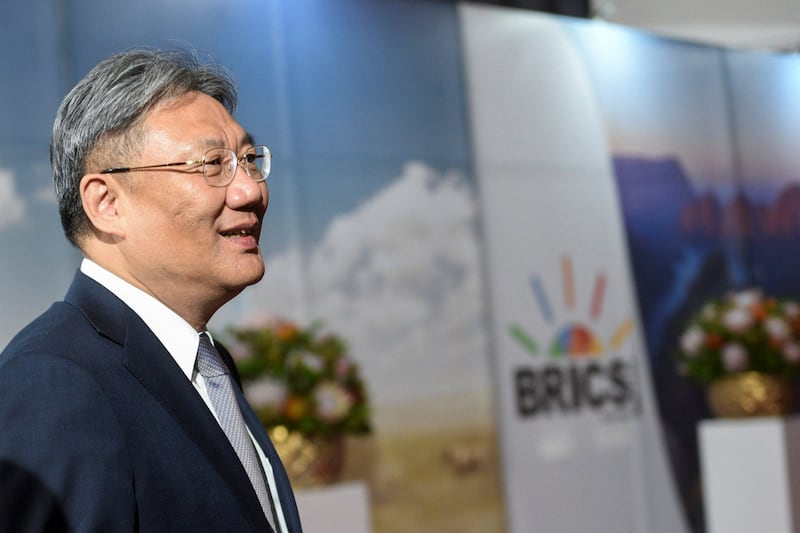United States Commerce Secretary Gina Raimondo is in Beijing on a trip Raimondo described as aiming to promote “healthy competition” while also holding China accountable for security issues of concern to the U.S.
“If you wanted to put a tagline to the trip and the mission, it is: protect what we must and promote where we can,” Raimondo said to reporters in the U.S. before leaving for Beijing.
On Monday, Raimondo told her Chinese counterpart Wang Wentao in Beijing that the U.S. does not aim to stifle China’s economic growth, adding that it seeks a “stable economic relationship that benefits both nations.”
“It’s complex and challenging. While we'll disagree on some points, I believe direct, open, and practical dialogue can lead to progress,” Raimondo said.
Raimondo is the fourth top U.S. official to visit China in three months. Her trip comes as the Biden administration is set to finalize restrictions on advanced semiconductors established last year and as China struggles to find its feet after last year’s pandemic lockdowns and amid a wide-ranging downturn in the property sector.
The commerce secretary said she aimed to improve travel and tourism between the U.S. and China, adding that bringing Chinese visitor numbers back to the levels before the pandemic could mean tens of thousands of U.S. jobs.
Among the “many challenges” to getting the U.S. and China back on the track to normalized trade relations, she said, are Beijing’s “unfair trade practices,” an expression that is sure to rankle with the Chinese Communist Party elite.

Beijing is already smarting at restrictions on exports of semiconductors, technology equipment and expertise, which are regarded as an attempt to hold back China's emergence as a technology leader. Chinese President Xi Jinping has called on President Biden to drop the restrictions.
Meanwhile, Raimondo is reportedly in high demand, both in China, which hacked her unclassified email earlier this year, and with the international business community, especially the semiconductor sector, but her visit coincides with a host of external events that underscore the rifts between the world's two leading superpowers.
Cloudy horizon
Just two weeks ago the U.S. struck a deal with Japan and South Korea that included defense cooperation commitments and vows to combat "economic coercion" – in obvious references to China. China in turn accused the U.S. of trying to divide the region and damage China's interests.
In further words that were unlikely to be music to Beijing’s ears, Japanese Prime Minister Fumio Kishida said all three countries would be members of the U.N. Security Council next year and they should put pressure on Beijing’s expansion and Pyongyang’s nuclear program.

Meanwhile, in another sign that U.S.-China tensions remain high, during last week’s BRICS summit in South Africa, Raimondo’s counterpart Wang Wentao read a statement from President Xi – who was unexpectedly unable to give the speech himself – that criticized the U.S. for its “hegemonic” tendencies.
Wang, via Xi, warned against “a new cold war” and criticized a nation “obsessed with maintaining hegemony” for undermining emerging markets and developing countries.
All the same, some observers conjecture that there are signs the two nations may be cautiously inching toward a more conciliatory space.
Chinese Premier Li Qiang has recently said the countries can benefit from trade cooperation and maintaining stable global supply chains, while the U.S. removed trade restrictions on 27 Chinese firms, a move that has received the nod from Beijing.
Separately, the U.S. Department of Transportation announced that it has agreed to add six more flights operated by Chinese airlines, effective Sept. 1.
"Such moves indicate that the Biden administration is gradually realizing that relentless suppression and restraint of China's development will impact America's own interests," Gao Lingyun, an expert at the Chinese Academy of Social Sciences in Beijing, told the Global Times on Saturday.
But ahead of her current Beijing mission, Raimondo, speaking to reporters in the U.S., was not pulling any punches on U.S. expectations of her trip.
“I want to be clear with you around what my goal is for the visit, which is to promote a healthy competition,” Raimondo said before she left for China. “And by that, I mean a competition on a level playing field, playing by the rules, because on a level playing field, nobody can outcompete American businesses or American workers.”
Edited by Mike Firn and Taejun Kang.
